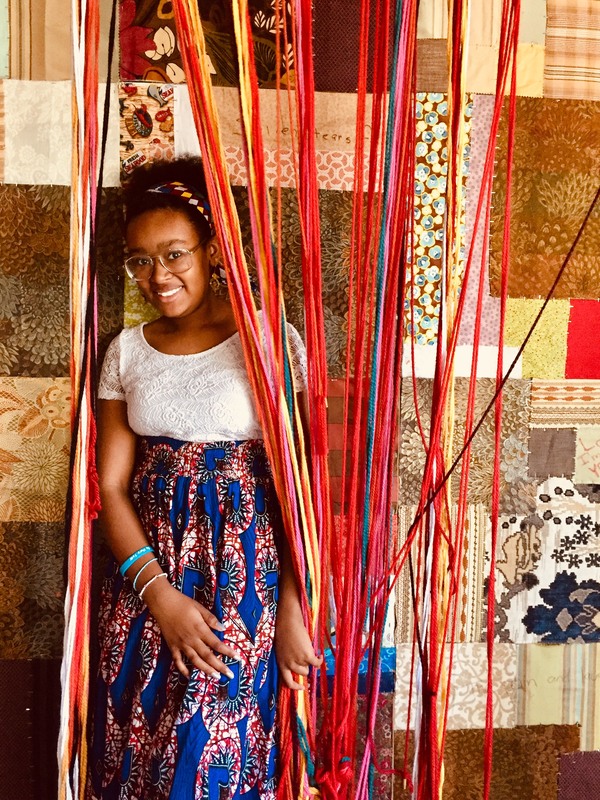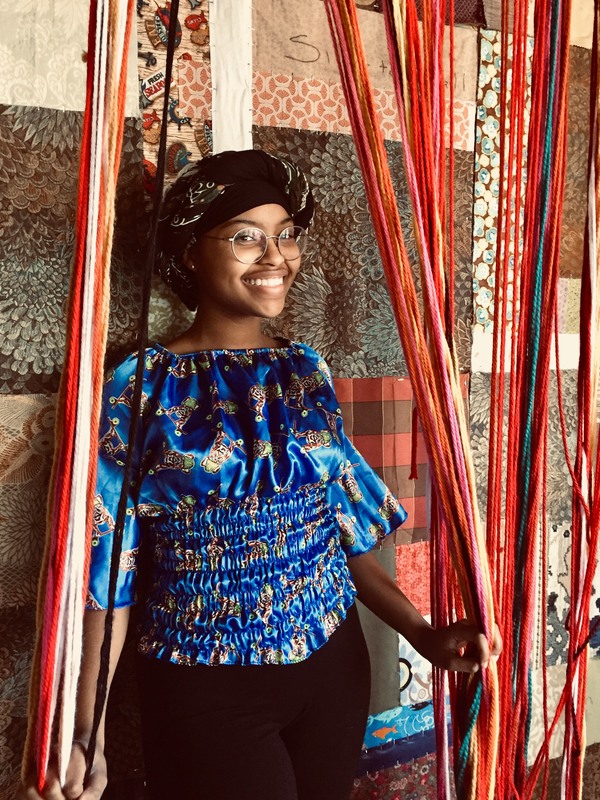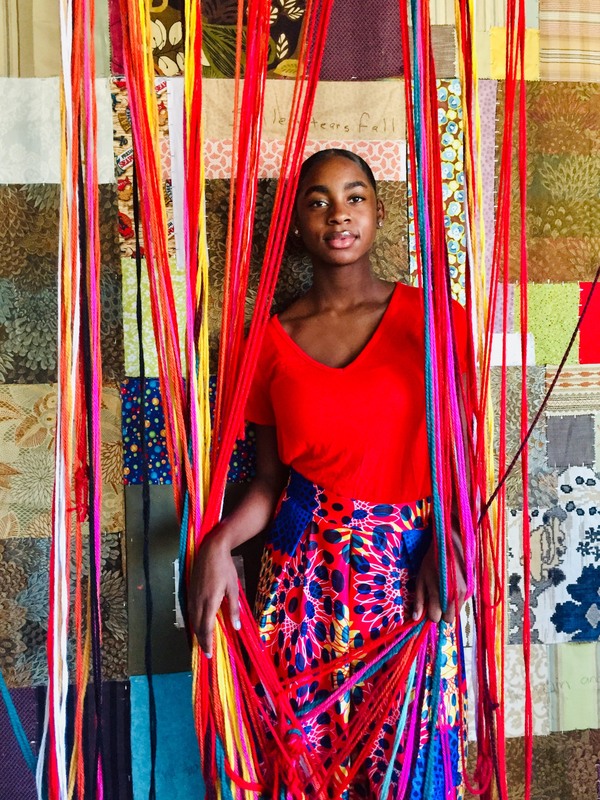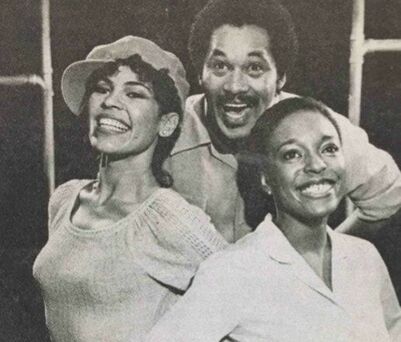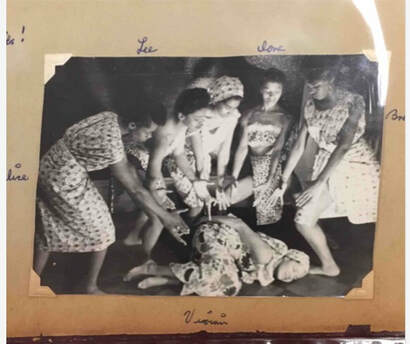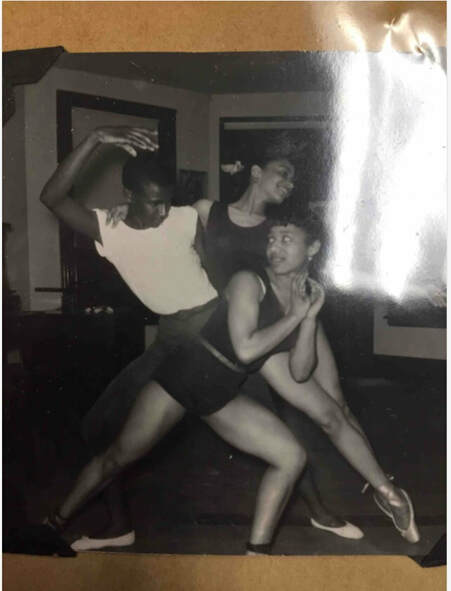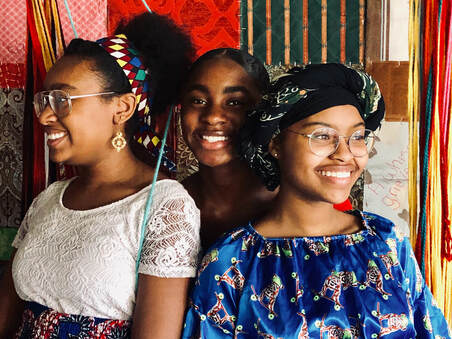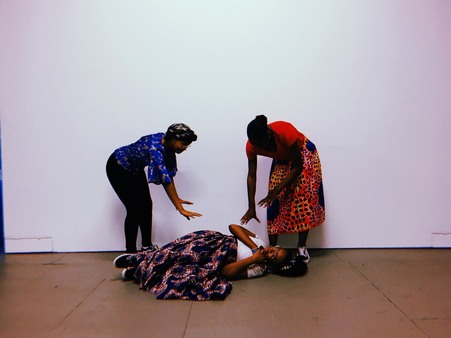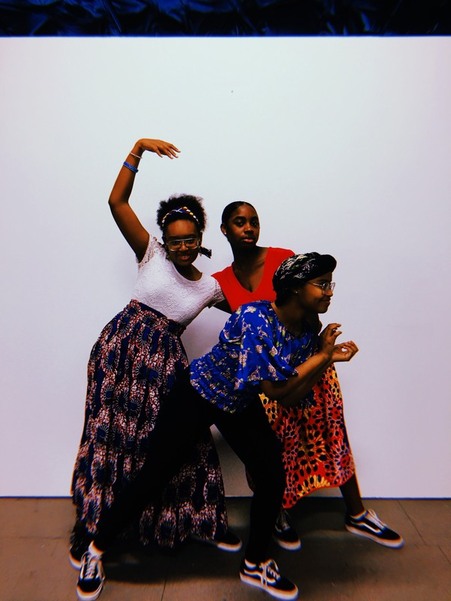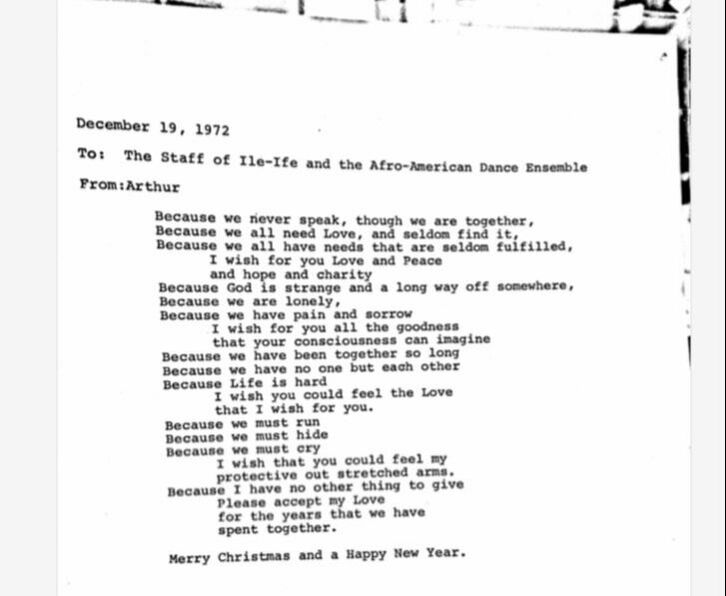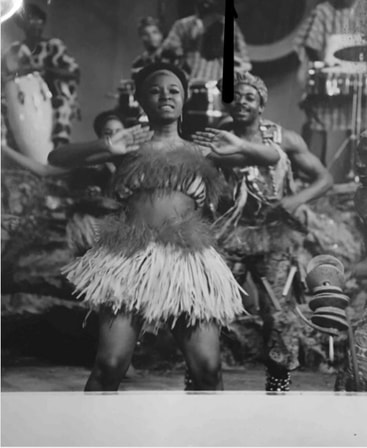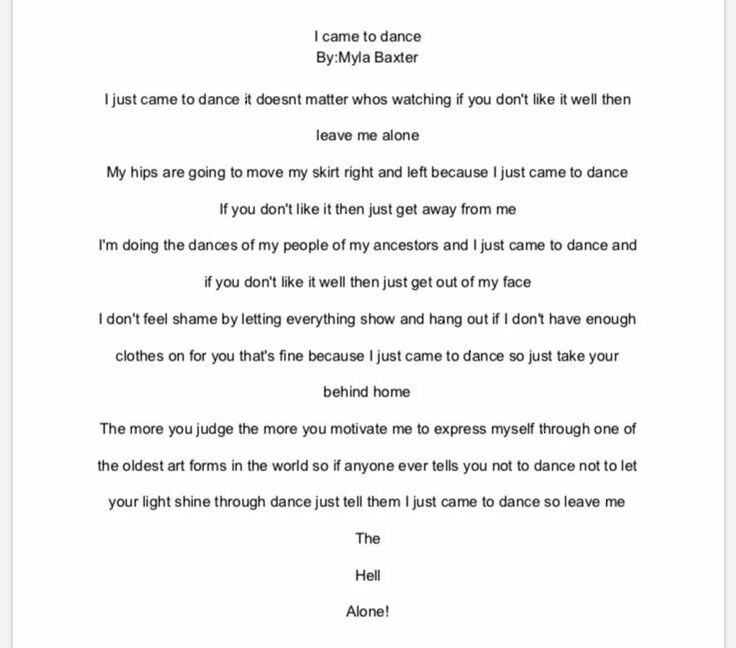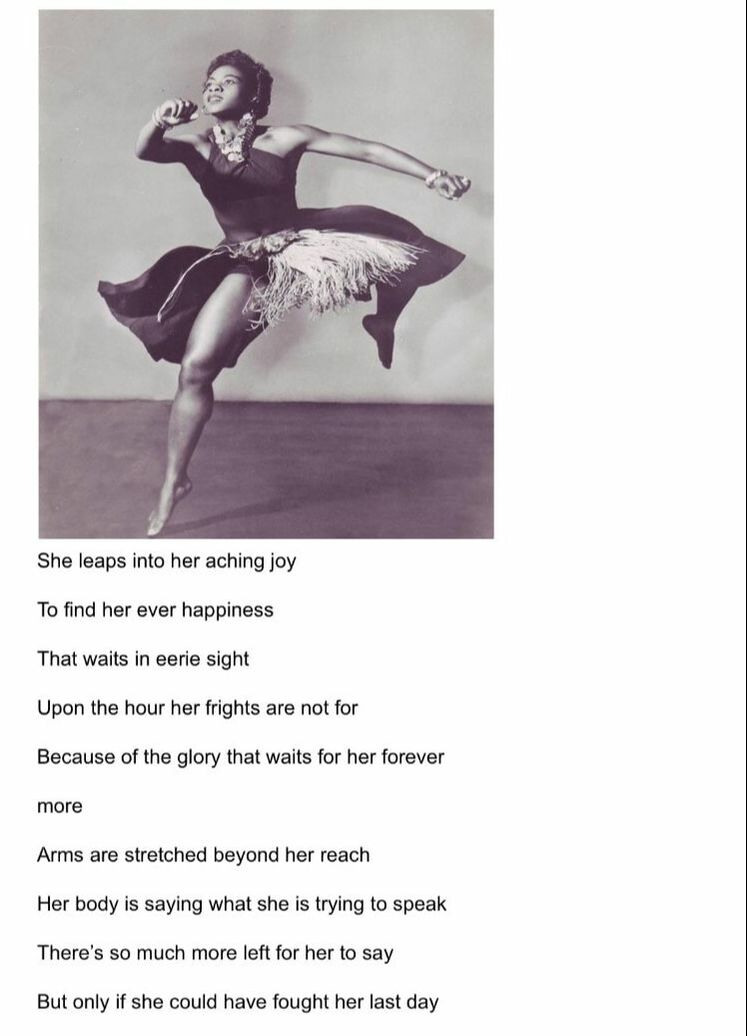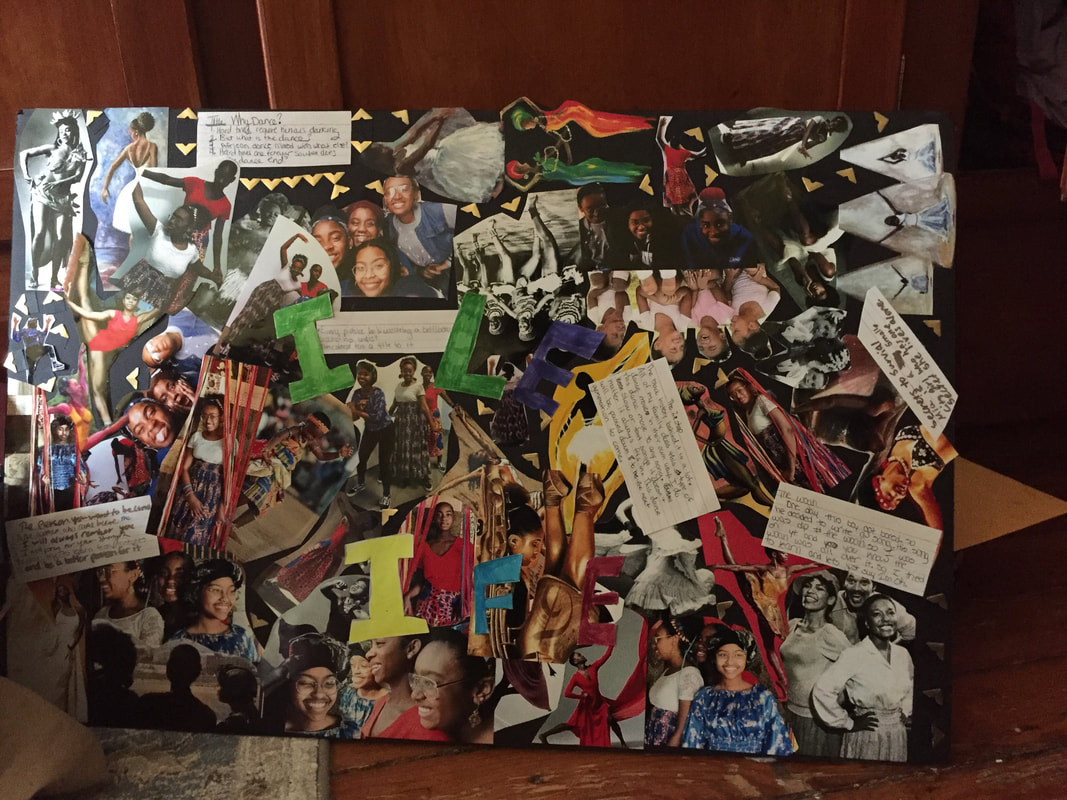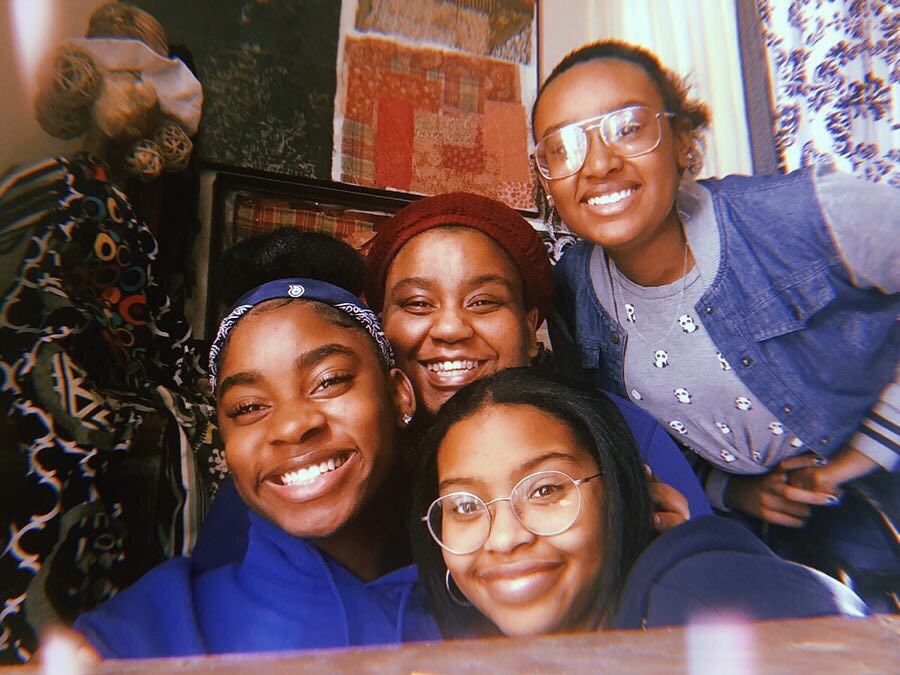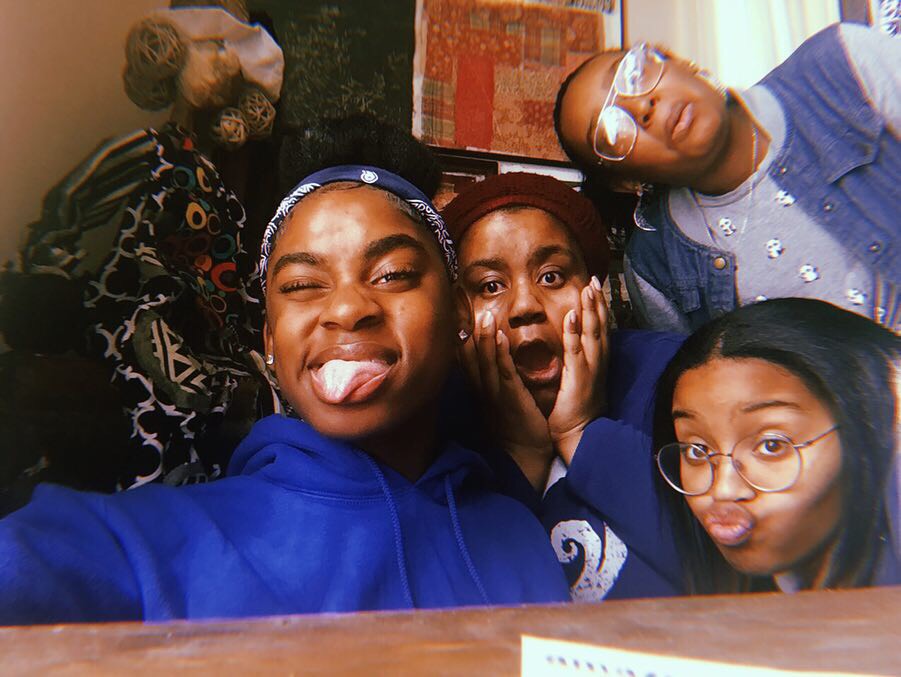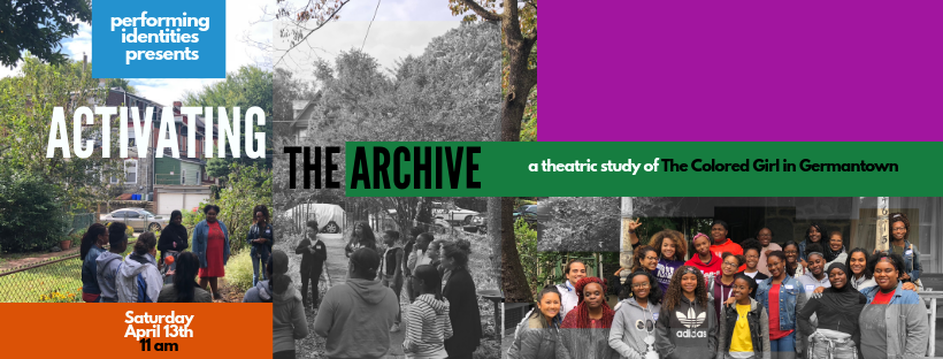|
By: Sabriaya Shipley with Myla Baxter, Madison Coleman, and Taylor Townsend Our cohort recreated some of the images we discovered during our Ile Ife archiving at the Charles Blockson Collection. Our first cohort writing assignment was a poetic or lyrical reflection on one of the images found in the Ile Ife archive. Our final performance piece will feature a poem we found written by Arthur Hall, one of the founders of Ile Ife, to the Ile Ife African American Dance Assemble. Madison chose an action shot for her reflection - While for Taylor there was an importance to collage all the photos together into one art piece! It has been nothing short of amazing and awe inspiring to watch their many growths and discoveries along this journey. They have really captured the Colored Girl in Germantown’s Ile Ife and in addition so many beautiful parts of themselves. As a Teaching Artist, there is nothing cooler than baring witness to young artist start their journey. As a Black Woman, it is healing to witness young Black girls stepping into themselves with such confidence!
1 Comment
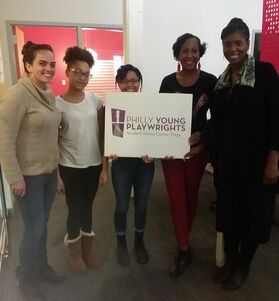 Iraissa Ann Reilly, Kennedy Griffin, & Alise Mackey with Pam Coleman & Jan Green. Iraissa Ann Reilly, Kennedy Griffin, & Alise Mackey with Pam Coleman & Jan Green. BY KENNEDY GRIFFIN AND ALISE MACKEY WITH ASSISTANCE FROM IRAISA ANN REILLY Every other Saturday since October, a group of fifteen young women of color have gathered together to learn more about the history of African American women in Philadelphia. It’s been a great collaboration between The Colored Girls Museum in Germantown, Philadelphia Young Playwrights, and various museums and archives throughout the city. As part of the program, called Performing Identities, we are in search of the colored girl—our mission is to discover her story, a story which up until now has gone untold. A history that has been buried within the stacks, preserved by those brave women who held onto these tangible items we would come to discover today. The items that would help us to discover her, in hopes of discovering something about ourselves. In January, we were divided into cohorts that would delve further into certain places that shaped that history:
We are the young women of the Ivy Leaf cohort, tasked with researching and performing a piece that would tell the story of the oldest African American school in the city of Philadelphia. This school, which was one of the largest of its kind in the nation, was founded in 1965 by Liller and William Green. In searching through fifteen boxes of materials at the Charles L. Blockson Afro-American Collection at Temple University, we learned that Ivy Leaf began as a pre-school when the Greens could not find a suitable school for their eldest daughter. It grew into an elementary school, later adding a middle school, with various locations. Ivy Leaf closed in 2008, but its legacy lives on through its students who went on to become successful lawyers, doctors, teachers, politicians, artists, and more, contributing to their communities and owing their successes to the nurturing environment and education that they received at Ivy Leaf. We were honored and grateful to speak with Pam Coleman and Jan Green, the daughters of Liller and William the last time that we met. Pam and Jan were students, and later worked at the school for a number of years after graduating college. Since we’ve been learning about Ivy Leaf from the archives, it was cool to get the perspective of these women who were students and employees of Ivy Leaf at one time. Before meeting, we were excited, but not sure what to expect. As it turns out, Ms. Pam and Ms. Jan were so nice, so it was fun to interview them. They were friendly and they had awesome stories to tell. You would ask a question and they would be very specific in their answer, which was very helpful. You could just tell that Ivy Leaf had a profound impact on their lives. We were struck by how successful everyone at Ivy Leaf became. Just hearing Miss Jan say she went to Hampton and Miss Pam went to Emory was impressive. Both women had all different kinds of jobs and had so many different talents that they could exhibit and they gave back to Ivy Leaf. When they think of alumni, they think of lawyers and educators and doctors- people who are extremely successful and it was such a nurturing environment that gave you confidence and really appealed to the entire self, that so many of its students became amazing members of society. They talked about how when they left Ivy leaf they moved from a predominantly black environment to schools that were predominantly white. The education they received at Ivy Leaf gave them a confidence and preparation going into these spaces knowing that they had received an education that surpassed most other schools. We are creating different kinds of pieces to share at Activating the Archive. I (Kennedy Griffin) am creating a poem about Ivy Leaf. After meeting with Miss Pam and Miss Jan I have a better Idea of what I would like to write about. I (Alise Mackey) am creating a monologue. The fact that they spoke of Ivy Leaf in such a positive way makes me rethink how I want to write the monologue. They way that they spoke of Ivy Leaf, it’s as though it is a place that is still living. The things that they founded are things that are still done today. I think the tone of my monologue will be something that is bittersweet, however after meeting with Miss Pam and Miss Jan it will be more about the fact that more that even though Ivy Leaf is physically over, it is something that continues in another form through its students. BY ISABEL MEHTA Germantown Friends junior Isabel Mehta continues her blog series about the process behind the 2019 Mouthful Monologue Festival. She is one of 18 winning student writers. 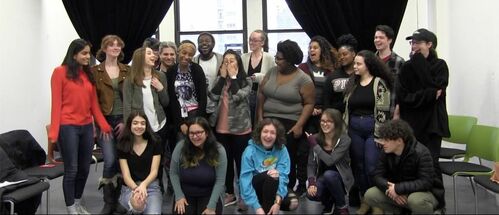 Writers with directors and dramaturgs at Dramaturgy Day. Writers with directors and dramaturgs at Dramaturgy Day. Most of the writing I do, I do alone. Alone in my room, at my desk, sitting in my bed, in the library. Very rarely do I interact with other slightly nerdy, quirky, passionate writers like myself. That is why I loved Dramaturgy Day #1, because every person I met had their own story to tell, a story that was chosen out of hundreds and given a platform to be shared. By 10 am on the cold Saturday morning of January 26th, 18 playwrights from all over Philadelphia made their way to the PYP Learning Lab. Some were dressed subtly, rather nondescript, like me. I wore dark blue skinny jeans and a red sweater paired with off-white Vans. One boy had bright red Converse. One girl wore her flaming red hair in pigtails, and another black tights with a short black mini skirt. Before I get to know people, I first notice their physical appearance. So this is what I noticed first, people’s clothes, shoes, and style. Everybody had a different style, a different way of expressing themselves to the world. It made for a dynamic and vibrant room, and I was thrilled. It is important to note that I am not an outwardly social person. In large groups, I tend to retreat into my shell. So when I first entered the Learning Lab, I felt slightly awkward in my own skin. I think many other people felt that way, too, but luckily Steve and Stephanie—two of the Festival's directors and dramaturgs—had planned a warm-up game for us all. One person in the center of the circle holds an imaginary pie in their hand, and rotates looking for someone to tag with the pie. After calling their chosen victim’s name, the person has approximately one second to duck before they are "pied in the face". If they don’t duck in time, they are the the new person in the center. It got pretty intense. After the game, everyone was louder, looser, more comfortable on their feet, including myself. It was the perfect way to start the day. After the lively warm-up, we headed to various locations around the PYP building to meet our dramaturgs, directors, actors, and several fellow playwrights. It was during the next few hours when I would meet three other young female playwrights like myself, and hear their work and mine read aloud and give and receive valuable feedback. This was my favorite part of the day, because I finally got to meet the faces behind the monologues. I loved "Becoming Friends with David Copperfield", and I finally got to meet and chat with the girl who wrote it. Same goes for "What I Wouldn’t Do" and "What You’ve Done". I also heard my piece read aloud for the first time ever, which was powerful as well. I immediately got a sense of what worked, and what needed to be changed. After meeting so many incredible female writers, I left those couple of hours feeling inspired to revise my monologue to its highest potential. To close the day, everyone returned to the Learning Lab more educated, inspired, and comfortable than they were when entering the space in the morning. No one was nervous and quiet, people were chatting, laughing loudly, snacking on the leftovers from lunch. We completed the day with a simple but powerful reflection activity. Everyone stood in a circle and took one penny from the jar passed around. The empty jar was then placed on the ground in the center of the circle. When moved to do so, one person at a time stepped forward, shared a short, one-sentence reflection about what they’re grateful for, and dropped the penny in the jar. The “ding” of the penny signified another person could step forward to share. This went on until everyone had dropped their penny in the jar. Hearing everyone’s unique reflections was a perfect way to end the day, because it reminded me why we’re all really here. When it comes down to it, we’re all here because we are passionate people. Passionate writers, storytellers, actors, directors, dramaturgs, teachers, artists, or all of the above. To be able to collaborate, inspire, and share our stories, to me, was what made this day, and what continues to make this process, so wonderful and special. BY ISABEL MEHTA Germantown Friends junior and PYP intern Isabel Mehta considers her time reading and selecting 2019 Mouthful Monologue Festival winners as part of the Final Committee. 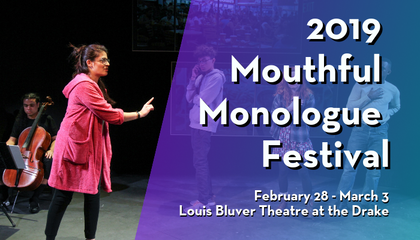 As a high school student, it’s easy for me to get caught up in my own world. I interact with the same people everyday - sit with the same people at lunch, talk to the same people in class, workout with the same people on my crew team - so I rarely gain new perspectives and become aware of experiences other than my own. That’s why sitting on the Final Committee was so great for me, because for the first time ever, I read writing from students that didn’t attend my school and was exposed to a breadth of student voices and stories from across Philadelphia. When I first started reading monologues, there were some things that I began to notice. There were many repeating themes, such as gun violence, sexual abuse, teen pregnancy, and various reflections on race issues. And while this is a generalization, many schools that are considered “urban” definitely had more work submitted that stemmed from these themes. It was, at times, difficult and uncomfortable to read these monologues. But that’s what made them powerful. Sitting in the comfort of a heated office building sipping lukewarm coffee, I read about a girl confronting her abuser and reclaiming her body and her story. I read about a boy who’s best friend was shot dead in the streets. I read about a girl who longed to be pregnant only to be devastated by the arrival of her period every month. These were stories with weight behind them, stories that jumped out from the computer screen, stories that resonate with people and transcend all identities and experiences. As I began to read more from suburban schools, I came across more quirky, “out of the box”, submissions. A balloon laments over her inevitable demise after she is “let go” by a child at a birthday party. A magician declares he must be best friends with David Copperfield. A teenager has a poignant daydream in class. Reading these were powerful too, but for different reasons. All good writing can tackle real and relevant issues through the refreshing lens of humor, and these writers did it with ease. I absolutely loved the funny monologues. When it came time to decide the winners, most members of the Final Committee came to the table with similar ideas of which monologues deserved a spot in the festival. There were, however, a couple areas of disagreement. This was a reminder, to me, to remember that everyone comes from different backgrounds and experiences that make them resonate with a particular monologue. While some people really want to push for a piece about a recently divorced father struggling to reconnect with his daughter, others will strongly advocate for a powerful piece about the use of the n-word in the black community. There will always be sacrifices made and good work that will not make it into the festival - that’s the price for choosing only 18 winners out of over 600 submissions. But what can be controlled is the flow of the festival, the diversity of monologues selected, and how we can give a platform to messages and stories that the world needs to hear, right now. That, at its core, is truly what the Mouthful Monologue Festival is all about. |
Categories
All
|
|
This work is licensed under a Creative Commons Attribution-NonCommercial-ShareAlike 2.0 Generic License.
|
|
© Philadelphia Young Playwrights - 1219 Vine Street, Floor 2 Philadelphia, PA 19107
Phone: 215-665-9226 Fax: 215-665-9228 Email: [email protected] |

